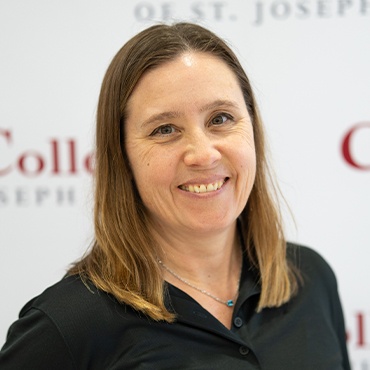
Kinesiology Program
Calumet College of St. Joseph’s Kinesiology program supports your passion for physical health and movement.
Through the science of movement, the Kinesiology degree prepares students to serve others’ physical conditions and improve their quality of life. Students will embrace the integration of the multi-dimensional study and application of physical activity.
Throughout the program, you will explore not only biological, medical and health-related aspects of human movement, but also psychological, social-humanistic, and professional perspectives. You will work on individual scientific assessments as well as evaluate and measure various aspects of the human body.
Graduates of Kinesiology are well-positioned for successful entry to graduate school for Athletic Training (MAT), Physical Therapy (DPT) and Occupational Therapy (OTD), or immediate entry into additional areas of the field for employment.
In the Kinesiology Program, you will:
- Learn how the scientific process informs our understanding of physical activity
- Critically evaluate information about physical activity from a scientific basis
- Evaluate research related to physical activity and its impact on health and chronic disease
- Design and evaluate physical activity programs that promote health and improve quality of life
- Critically evaluate scholarly work related to cultural, historical and philosophical dimensions of physical activity
Request Information
Career
Options
Career options with this major include but are not limited to:
- Athletic Administration
- Athletic Coach
- Athletic Trainer
- Campus Fitness Center Director
- Cardiac Rehabilitation Specialist
- Clinical Exercise Physiologist
- Corporate Fitness & Wellness Coordinator
- Exercise Physiologist
- Fitness Industry Sales and Management
- Fitness Specialist
- Group Fitness Instructor
- Movement & Performance Specialist
- Occupational Therapist
- Personal Fitness Trainer
- Physical Education Teacher
- Physical Therapist
- Professor of Kinesiology/Exercise Science
- Sport Management
- Sport Psychologist (Specialty: Sport Performance)
- Strength & Conditioning Coach

About Kinesiology
Faculty
Audra Kielbowicz, M.S.
Tina Schmidt McNulty
Tracy Stone, Ed.D.
Program
Objectives and requirements
122 credit hours
Students in the Kinesiology Program should:
- Explain how the scientific process informs our understanding of physical activity.
- Describe the underlying scientific foundations of physical activity.
- Critically evaluate information about physical activity from scientific basis.
- Describe the relationship between physical activity participation and health, wellness, and quality of life.
- Demonstrate knowledge of current physical activity guidelines and recommendations.
- Critically evaluate research related to physical activity and its impact on health and chronic disease.
- Design and evaluate physical activity programs that promote health and improve quality of life.
- Describe the sociocultural and historical factors that influence physical activity.
- Critically evaluate scholarly work related to cultural, historical and philosophical dimensions of physical activity.
- Demonstrate an appreciation and commitment to physical activity practice.
The following courses are required for a baccalaureate degree:
38 credit hours in General Education
Students in the Kinesiology Program must choose the following General Education options:
- MATH 171, Principles of Statistics as the required Math choice
- BIOL 115, Cell and Evolution, as the required Science choice
- PHIL 200, Great Philosophical Ideas, as the required Humanities choice
- PSY 100, Introduction to Psychology, and
- SOCL 210, General Sociology, as the required Social Science choices
49 credit hours in Mid-Level Requirements
- BIOL 215 Medical Terminology (2 credits)
- BIOL 300 Human Anatomy and Physiology I Lecture (3 credits)
- BIOL 300L Human Anatomy and Physiology I Lab (1 credit)
- BIOL 305 Human Anatomy and Physiology II Lecture (3 credits)
- BIOL 305L Human Anatomy and Physiology II Lab (1 credit)
- CHEM 143 Nutrition Lecture (3 credits)
- CHEM 143L Nutrition Lab (1 credit)
- CHEM 200 General and Analytical Chemistry I Lecture (3 credits)
- CHEM 200L General and Analytical Chemistry I Lab (1 credit)
- CHEM 205 General and Analytical Chemistry II Lecture (3 credits)
- CHEM 205L General and Analytical Chemistry II Lab (1 credit)
- EXSS 200 Certified Personal Trainer (2 credits)
- EXSS 215 Survey of Physical Education Health (3 credits)
- KINE 110 Introduction to Kinesiology and Exercise Science (3 credits)
- KINE 210 Exercise Psychology and Behavioral Physical Activity (3 credits)
- MATH 230 Calculus I (4 credits)
- MATH 231 Calculus II (4 credits)
- PHYS 300 Physics I Lecture (3 credits)
- PHYS 300L Physics I Lab (1 credit)
- PHYS 305 Physics II Lecture (3 credits)
- PHYS 305L Physics II Lab (1 credit)
35 credit hours in Upper Level Requirements:
- EXSS 400 Principles of Conditioning (3 credits)
- EXSS 410 First Responder (2 credits)
- EXSS 415 Fitness Assessment/Program (3 credits)
- EXSS 420 Techniques & Practices of Strength and Conditioning (1 credit)
- EXSS 425 Techniques & Practices of Exercise Instruction (1 credit)
- EXSS 435 Kinesiology Lecture (3 credits)
- EXSS 435L Kinesiology Lab (1 credit)
- KINE 300 Exercise Physiology I (3 credits)
- KINE 305 Exercise Physiology II (3 credits)
- KINE 343 Applied Nutrition (3 credits)
- KINE 360 Psychomotor Development and Movement (3 credits)
- KINE 365 Care and Prevention of Injury and Illness (3 credits)
- KINE 490 Internship in Kinesiology I (3 credits)
- KINE 495 Internship in Kinesiology II (3 credits)
Incoming student applicants for all the majors within the Biophysical Chemistry and Mathematics Department will be required to have a 2.0 high school grade point average (GPA) and an ACT score of 19, or the consent of the program director. Incoming freshmen who do not meet the requirements for admission into the Biophysical Chemistry and Mathematics Department will have one academic year to meet the admission requirements. This approach will allow academically talented students who begin college without the proper academic background to demonstrate their potential and retain eligibility in the department. Transfer students wishing to enter a Biophysical Chemistry Department shall maintain a 2.5 GPA in their science major classes and a minimum cumulative GPA of 2.0.
All students within the Biophysical Chemistry and Mathematics Department must maintain a minimum GPA of 2.5 in their science major courses and a minimum cumulative GPA of 2.0. If a student’s GPA drops below the required minimum GPA, he or she will have a one-semester probation period to increase their GPA. During this probationary period, the student must meet with the advising office, an assigned mentor, and the Student Success Center for additional support to get back on track. Students who are not successful in raising their GPA within a onesemester period will lose their eligibility to graduate with a degree in Biomedical Science.
You Belong
at Calumet College of St. Joseph!




